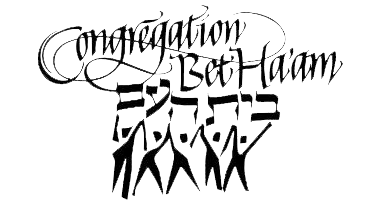Shabbat Vayeitzei
December 2, 2022 – 9 Kislev 5783
Congregation Bet Ha’am
Rabbi Jared H. Saks
I learned a story from the Talmud early in the pandemic that brought me hope. In Tractate Makkot (24b), we read a story about a group of rabbis who ascend to Jerusalem after the destruction of the Temple by the Romans. They arrive at the top of Har HaTzofim, Mount Scopus, just northeast of the walled city. Looking down, they see the Temple Mount in ruins and, following Jewish custom, they tear their clothing in mourning. Then, the rabbis descend and approach the Temple Mount, where they see a fox emerging from the rubble that was the Holy of Holies. As most of the rabbis begin to weep, Rabbi Akiva stands there laughing. His colleagues are puzzled and ask what on earth could be making him laugh at this moment. As rabbis are wont to do, he replies to their question with one of his own: What is making you weep? They tell him that they are seeing the holiest of places in Jewish life as a fox walks out of its rubble. Why wouldn’t they weep?
But Rabbi Akiva responds by reminding them of the prophesies of Uriah the Priest and Zechariah son of Jeberchiah. While the former prophesies about the total destruction of Zion, the latter promises that the time will still come that will see peace in the land. The prophecy of Zechariah depends upon the prophecy of Uriah for its fulfillment. Jerusalem cannot be rebuilt before its destruction. Rabbi Akiva then teaches, “As long as Uriah’s prophecy had not been fulfilled, I feared that Zechariah’s prophecy might not be fulfilled either. But now that I have seen the destruction prophesied by Uriah, I know that the restoration predicted by Zechariah will still yet come true.” Even in the most challenging moments, there’s always hope.
While it may feel that the world is, at times, crumbling around us, especially again with this week as antisemitism makes front page news, there’s hope to be found in this moment of upheaval. Truth be told, I don’t want to talk about antisemitism. I spoke about it a few weeks ago in a drash that you can find on our blog through our website. Even then, I didn’t really want to talk about antisemitism, not because I don’t believe it’s a threat – it’s always been a threat. And not because I don’t believe that it’s worse now. But because I don’t want to live a Judaism that is defined by those who hate us. Our Judaism is so much more than that.
I believe that one of the most important ways that we can combat antisemitism is by building relationships with others, especially through justice work because injustice against any of us is injustice against all of us. But the other, perhaps even more important, is that we proudly live our Jewish lives.
In the preface to his 1964 novel, The Gates of the Forest, Elie Wiesel tells this Hasidic tale of the Baal Shem Tov:
When the great Rabbi Israel Baal Shem-Tov saw misfortune threaten the Jews, it was his custom to go into a certain part of the forest to meditate. There he would light a fire, say a special prayer, and the miracle would be accomplished and the misfortune averted. Later when his disciple, the celebrated Maggid of Mezritch, has occasion, for the same reason, to intercede with heaven, he would go to the same place in the forest and say: “Master of the Universe, listen! I do not know how to light the fire, but I am still able to say the prayer.” And again the miracle would be accomplished. Still later, Rabbi Moshe-Leib of Sasov, in order to save his people once more, would go into the forest and say: “I do not know the prayer, but I know the place and this must be sufficient.” And it was sufficient and the miracle was accomplished. Then it fell to Rabbi Israel of Rizhyn to overcome misfortune. Sitting in his armchair, his head in his hands, he spoke to God: “I am unable to light the fire and I do not know the prayer; I cannot even find the place in the forest. All I can do is tell the story, and this must be sufficient.” And it was sufficient.
Proudly live your Jewish life and keep telling our story. Existence is resistance. Shabbat Shalom.

